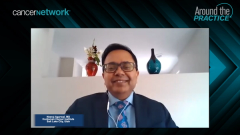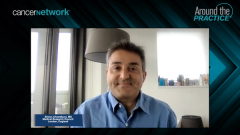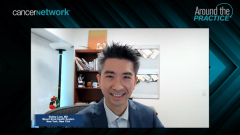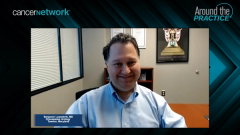
Is There a Role for Triplet Therapy in Low-Volume mCSPC?
A brief discussion on the use of doublet versus triplet therapy in patients with low-volume metastatic prostate cancer.
Episodes in this series

Transcript:
Neeraj Agarwal, MD: Bobby, how do you approach this? We have this patient with high-volume disease. Let’s say the patient had low-volume disease that is still de novo. How are the processes different? How will you treat them differently from high-volume de novo disease?
Bobby Liaw, MD: I’ll quickly take a small trip back to the PEACE1 data. PEACE1 included patients with low-volume disease, and it also tried to understand what benefit the triplet regimen confers on these patients. With the most recent data analysis, there haven’t been any conclusive responses in terms of overall survival benefit for these low-volume patients. Further longitudinal follow-up may change that, but unfortunately there’s not a lot of strong evidence that patients with low-volume disease would necessarily benefit from a triplet regimen.
For low-volume patients, I’m not going to try to persuade them to take 3 different therapies at the same time. There are some exceptions to that. When we define high-volume disease, we’re looking at the CHAARTED criteria, which is primarily focused on the number of lesions. They don’t get at the heart of the matter: the overall actual volume of disease. One tiny, 0.5-mm bone lesion still counts as a bone lesion for CHAARTED. But if you have a 10-cm lymph node that’s obstructing kidney function, that’s still 1 lesion.
There are well-known, poor prognostic features of disease that CHAARTED doesn’t fully accommodate, such as Gleason score and height of PSA [prostate-specific antigen]. There are some gray areas. Even if someone has low-volume disease, with very large, obstructive lymph nodes, that doesn’t meet high-volume disease criteria. But if you need something, if they’re highly symptomatic and they need an immediate response, then there’s room to make a case for much more aggressive triplet-type therapy. Does that mean that it’s necessarily better over a doublet? I don’t have those data. I don’t know.
To your point, I don’t know if we’re going to have great randomized prospective studies to demonstrate this in the near future. Most likely, we’re going to have to come together as a medical community to understand what the real-world data tell us to help inform some of these decision-making processes. But for low-volume patients, I’m still mostly thinking about doublet therapies.
Neeraj Agarwal, MD: Thank you.
Transcript edited for clarity.
Newsletter
Stay up to date on recent advances in the multidisciplinary approach to cancer.












































